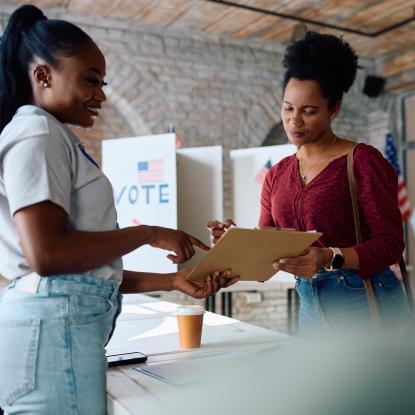


When New Hampshire voters picked up the phone earlier this year and heard what sounded like the voice of President Joe Biden asking them not to vote in that state’s primary election, the stage was set for an unprecedented election year. The call was a deepfake — and the first major instance of artificial intelligence being used in the 2024 election. With the rise of AI tools that can credibly synthesize voices, images and videos, how are voters supposed to determine what they can trust as they prepare to cast their votes?
To find out how lawmakers and civil society are pushing back against harmful false narratives and content, we talked with experts engaging the problem on several fronts. Stephen Richer, an elected Republican in Phoenix, posts on X (formerly Twitter) to engage misinformation head-on to protect Arizona voters. Adav Noti, the executive director of CLC, explains how good-governance advocates are hurrying to catch up with a profusion of new digital tools that make the age-old practices of misinformation and disinformation faster and cheaper than ever. And Mia Hoffman, a researcher who looks at the effects of AI on democracies, reminds voters not to panic — that bad information and malicious messaging don’t always have the power to reach their audience, let alone sway people’s opinions or actions.
Host and Guests:
Simone Leeper litigates a wide range of redistricting-related cases at CLC, challenging gerrymanders and advocating for election systems that guarantee all voters an equal opportunity to influence our democracy. Prior to arriving at CLC, Simone was a law clerk in the office of Senator Ed Markey and at the Library of Congress, Office of General Counsel. She received her J.D. cum laude from Georgetown University Law Center in 2019 and a bachelor’s degree in political science from Columbia University in 2016.
Stephen Richer is the 30th Recorder of Maricopa County. He was elected in November 2020 and took office in January 2021. His office of approximately 150 employees records hundreds of thousands of public documents every year, maintains a voter registration database of 2.4 million voters -- the second largest voting jurisdiction in the United States -- and administers the mail voting component of all elections in Maricopa County. Prior to his time as Recorder, Stephen worked in various business sectors and, later, as an attorney at the law firms Steptoe & Johnson LLP and Lewis Roca LLP. He holds a J.D. and M.A. from The University of Chicago and a B.A. from Tulane University. He is completing his PhD at Arizona State University.
Adav Noti is Executive Director at Campaign Legal Center. He has conducted dozens of constitutional cases in trial and appellate courts and the United States Supreme Court. He also advises Members of Congress and other policymakers on advancing democracy through legislation. Prior to joining CLC, Adav served for more than 10 years in nonpartisan leadership capacities within the Office of General Counsel of the Federal Election Commission, and he served as a Special Assistant United States Attorney for the District of Columbia. Adav regularly provides expert analysis for television, radio, and print journalism. He has appeared on broadcasts such as The Rachel Maddow Show, Anderson Cooper 360, PBS NewsHour, and National Public Radio's Morning Edition, and he is regularly cited in publications nationwide, including the New York Times, Washington Post, USA Today, Politico, Slate, and Reuters.
Mia Hoffmann is a Research Fellow at Georgetown’s Center for Security and Emerging Technology. Her research focuses on AI harm incidents, aiming to provide a deeper understanding of failure modes and the efficacy of risk mitigation practices. In recent work, she examined the uses of AI in US election administration and their risks to electoral integrity. Prior to joining CSET, Mia worked at the European Commission and as a researcher in Brussels, where she studied AI adoption and its implications. She holds a MS in Economics from Lund University and a BS in International Economics from the University of Tuebingen.
Links:
How Artificial Intelligence Influences Elections, and What We Can Do About It - Campaign Legal Center
How 2024 presidential candidates are using AI inside their election campaigns - CNBC
Nonprofit group plans ad campaign using AI misinfo to fight AI misinfo - Politico
CLC Op-Ed Examines Artificial Intelligence Disinformation in Elections - Campaign Legal Center
Congress should pass bipartisan bills to safeguard elections from AI - Campaign Legal Center
About CLC:
Democracy Decoded is a production of Campaign Legal Center, a nonpartisan nonprofit organization which advances democracy through law at the federal, state and local levels, fighting for every American’s right to responsive government and a fair opportunity to participate in and affect the democratic process. Learn more about us.
Democracy Decoded is part of The Democracy Group, a network of podcasts that examines what’s broken in our democracy and how we can work together to fix it.
